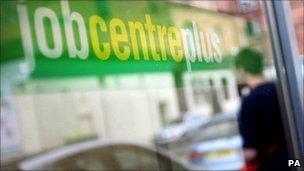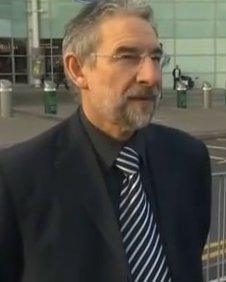Midlands jobless figures rise again bucking UK trend
- Published
- comments

Unemployment in the West Midlands has risen by 18,000 in the three months to June
Any increase in unemployment is depressing in itself, especially when long-term and young job seekers appear to be bearing the brunt of it.
But figures released by the Office for National Statistics on Wednesday are especially worrying here in the West Midlands.
The increase of 18,000 during the three months to June, compared with the previous quarter, offer grim confirmation that unemployment in this part of the country has been rising steadily for most of this year, while the general trend across the UK has maintained its reassuring downward trajectory.
Our region's unemployment rate of 9.9% puts us second only to the 10.3% recorded in the North East.
It undermines the government's oft-repeated pledge to "rebalance the economy" by redistributing some of the economic warmth of southern England to less prosperous areas of the country like ours.
Labour will be emboldened in their efforts to show that living standards in many areas of Britain have declined sharply since the coalition government was formed three years ago.
No less worryingly, some further number-crunching reveals similar disparities are widening even within our own region.
Jobs are being created as fast as anywhere in the country in parts of Birmingham, Solihull, south and east Staffordshire and Warwick and Leamington.
But at the same time, there are large swathes of structural long-term unemployment which are stubbornly resistant to policies, including the government's much-vaunted Work Programme.
'Skills deficit'
The most deprived areas of Birmingham, the Black Country, Coventry and Stoke-on-Trent are conspicuously missing out on the general air of increasing optimism that has greeted the recent signs of a general - if tentative - economic upturn.

Steve Brittan said there was still a "skills deficit"
All this comes just a week after the new governor of the Bank of England, Mark Carney, decided (subject to some escape clauses allowing for any economic shocks, for example on inflation), to devolve the setting of interest rates to what we like to call "the real economy".
His chosen measure - unemployment. They will rise from their current historic low of 0.5% only when unemployment has fallen to 7%.
But here it's running at 2% above the UK average and counting. Will that "real economy" of ours usher-in a corresponding devolution of an economic policy specifically-tailored to the challenges facing us here?
I think not.
But while the numbers keep turning out as they are are, demands are bound to grow for more targeted measures here.
The president of the Birmingham Chamber of Commerce, Steve Brittan, points to the paradox revealed in the jobless figures.
"Firms tell us they are still facing recruitment difficulties but this could be explained by the high skills deficit," he warns.
And the political significance of all this is increasingly apparent in this "weather vane" region with its abundance of marginal seats.
If the Conservatives are to have any chance of forming a government in their own right in May 2015, they will need to target seats like Dudley North, Walsall South, Birmingham Northfield and Telford.
Labour stand ready to ask voters in these key seats what exactly they feel they have to show for the past few years under the coalition government.
As one government minister told me recently: "It's all on the economy now."